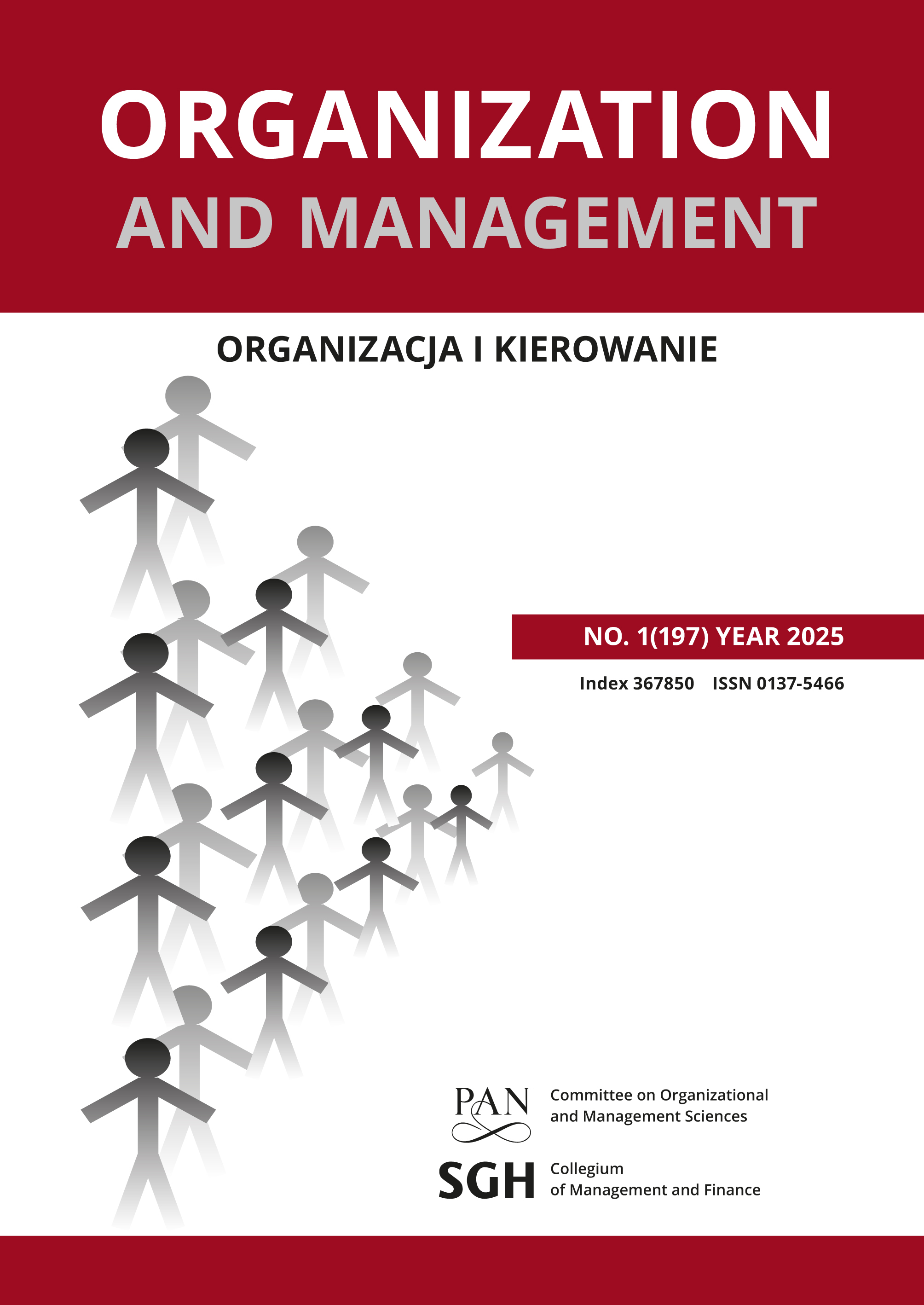Management in Decentralized Autonomous Organizations (DAO): Analysis of Proposals
Main Article Content
Abstrakt
The emerging trend in information technology, Web 3.0, offers the necessary technology to build Decentralized Autonomous Organizations (DAOs). These innovative, fully digital organizational structures utilize both human and artificial intelligence (AI). Operating entirely in the virtual realm and unaffiliated with any physical entities, DAOs function autonomously, free from external interference. Additionally, DAOs hold virtual assets that can be employed for creating and signing digital contracts with humans or for investment purposes. Governance within a DAO is a collaborative effort, managed by both AI and token holders.
My previous research established that DAOs have features and tools that empower their managers, whether AI or human, to carry out all four fundamental functions of management: Planning, Organizing, Controlling, and Leading. The cornerstone of DAO management is its proposal and voting mechanisms, which constitute its core functionalities.
The aim of this study was to investigate how DAOs use proposals to execute these fundamental functions of management. Given the transparent nature of DAOs and the permanent archiving of all proposals on the blockchain, I was able to examine a comprehensive dataset of proposals across a majority of existing DAOs. Latent Dirichlet Allocation (LDA) was employed for the analysis of proposal titles and content. As of the data collection date, a total of 15,256 DAOs were available for study, of which 175 were ultimately selected for in-depth analysis.
The most significant conclusion is that proposals are primarily utilized for the Planning and Organizing functions. The study also revealed that a considerable portion of management activities in DAOs occurs outside the formal proposal and voting mechanisms.
Article Details
Bibliografia
Blei D. M., Ng A. Y., Jordan M. I. [2003], Latent dirichlet dllocation, Journal of Machine Learning Research 3: 993–1022.
Buchleitner C., Rabl T. [2017], Blockchain and smart contracts – Vom Ender der Institutionen, ECOLEX – Fachzeitschrift fur Wirtschaftsrecht: 4–14.
Buterin V. [2014] A next-generation smart contract and decentralized application platform, Ethereum White Paper.
Chohan U. W. [2017], The decentralized autonomous organization and governance issues, SSRN Electronic Journal, https://doi.org/10.2139/ssrn.3082055.
Davidson S., De Filippi P., Potts J. [2016], Economics of blockchain, Available at SSRN 2744751.
DuPont Q. [2017], Experiments in algorithmic governance: A history and ethnography of “The DAO”, a failed decentralized autonomous organization, in: Bitcoin and beyond, Routledge, London: 157–177.
Griffin R. [2022], Fundamentals of management, Cengage Learning.
Griffiths M. [2022], Is LaMDA sentient? AI & SOCIETY, https://doi.org/10.1007/s00146-022-01559‑z.
Hsieh Y., Vergne J. [2018], Bitcoin and the rise of decentralized autonomous organization, Journal of Organization Design 7 (14), https://doi.org/10.1186/s41469-018-0038-1.
DeepDAO [2022], https://deepdao.io, accessed: 24.10.2022.
Introduction to smart contracts [2024], https://ethereum.org/en/smart-contracts/, accessed: 24.10.2022.
https://midjourney.com, accessed: 28.10.2022.
Ilyushina N., Macdonald T. [2022], Decentralised autonomous organisations: A new research agenda for labor economics, The Journal of the British Blockchain Association.
Jani S. [2020], Smart contracts: Building blocks for digital transformation, Indira Gandhi National Open University.
Kaplan A. M., Haenlein M. [2010], Users of the world, unite! The challenges and opportunities of social media, Business horizons 53 (1): 59–68.
Kondova G., Barba R. [2019], Governance of decentralized autonomous organizations, Journal of Modern Accounting and Auditing 15 (8), https://doi.org/10.17265/1548-6583/2019.08.003.
Korpal G., Scott D. [2022], Decentralization and web3 technologies.
Łabędzki R. [2023], Zdecentralizowana autonomiczna organizacja, in: Juchnowicz M., Zarządzanie Kapitałem Ludzkim w Warunkach Niepewności. Wyzwania i implikacje, Polskie Wydawnictwo Ekonomiczne, Warsaw.
Łabędzki R., Gadomski P., Multaniak P. [2021], Impact of employee stock ownership plans on productivity in video game companies, WSEAS Transactions On Business And Economics 18: 1235–1254, https://doi.org/10.37394/23207.2021.18.115
Metjahic L. [2018], Deconstructing the Dao: The need for legal recognition and the application of securities laws to decentralized organizations, Cardozo Law Review 39: 1533–1550.
Nakamoto S. [2008], Bitcoin: A peer-to-peer electronic cash system, Decentralized Business Review.
Reyes C. L. [2019], If Rockefeller were a coder, The George Washington Law Review 87: 373.
Schwab K. [2017], The fourth industrial revolution, Currency.
Tapscott D., Tapscott A. [2016], Blockchain revolution: How the technology behind bitcoin is changing money, business, and the world, Penguin, London.
Taylor F. W. [1911], The principles of scientific management, Harper & Brothers, New York.
Tse N. [2020], Decentralised autonomous organisations and the corporate form, Victoria University of Wellington Law Review 51 (2): 313–356, https://doi.org/10.26686/vuwlr.v51i2.6573.
Virovets D., Obushnyi S. [2021], Decentralized autonomous organizations as the new form of economic cooperation in digital world, The USV annals of economics and public administration 20 (2 (32)): 41–52.
Wojtczuk-Turek A. [2022], Zarządzanie kapitałem ludzkim w warunkach zrównoważonego rozwoju, Wydawnictwo Naukowe PWN, Warsaw.
